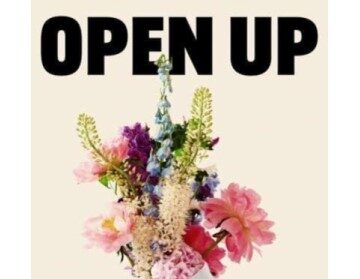Joshua Jones delves into Open Up the new collection from Granta Best Young Novelist 2023, Thomas Morris, and finds stories sandwiched between reality and fantasy.
When someone says a work of literature, or art has changed their life, it’s easy to meet the statement with a heavy eyeroll. As a young writer, working on the first drafts of what would become my own short story collection, Local Fires, I was recommended to read Thomas Morris’ debut collection, We Don’t Know What We’re Doing. Each story, set in Morris’ hometown of Caerphilly, I felt I had lived. I had walked the same streets as his characters’, experienced similar anxieties. I felt seen. It inspired me to alter the course of my own work, setting each story in my own home, Llanelli. Another deprived, semi-forgotten Welsh town where the people are directionless. I went into Open Up, then, with high hopes.
The opening story, ‘Wales’, stalks familiar ground to those in We Don’t Know What We’re Doing, but with the sureness of a writer who has found their footing between their first and second body of work. Like the eight years age gap between me and my younger brother, there has been time to grow, learn past the mistakes and discrepancies of the former. The story follows a young boy attending a football match on home ground with his father, estranged from the boy’s mother, who is also acutely aware, in that way children are, of his parents’ financial pressures. The narrative of the football match between Wales and Northern Ireland is also an effective allegory for the place where Morris was born, and the place where he’s made a home for himself.
What is immediately striking about this suite of stories is the striving to exist within a non-place sandwiched between reality and simulacra. The imagery in ‘Wales’ of a concourse, carparks and queues, the football field “lit like a stage”, the difference between a live match and the television. The bars and airport in ‘Passenger’ are just some of these occupied communal spaces, such as public bathrooms, supermarkets, and office blocks elsewhere in these pages. Gareth, the young protagonist in ‘Wales’, is separated from his mother in Asda, when a wrong turn takes him to “the blue corridor outside of everything”. His counterpart in ‘Aberkariad’ meets his mother for the first time in the homonymous sacred pilgrimage site for young males – seahorses – seeking debauchery and copulation on the side of a volcano.
Commonalities run through ‘Aberkariad’ and ‘All the Boys’ – a highlight from WDKWWD, which follows a troupe of Welsh lads on a stag-do in Dublin. Both stories are occupied with sex and gender roles, masculinity, and the heteronormative expectations of marriage and traditional family values. ‘Aberkariad’ goes further than the earlier story, choosing to use the metaphor of seahorses to anchor its themes. Male seahorses give birth and get pregnant while, in this story at least, the female seahorses are aloof, emotionally unavailable, don’t stick around to rear their children – much like many of their male human equivalent. The young seahorse ultimately desires escape from the circumstance of his life – societal expectation, rigid gender roles. Glyn, in ‘Birthday Teeth’, desires his canines to be sharpened into fangs to physically realise the fantastical image he has of himself as a real-life vampire. He stays awake throughout the night, finding community in chat forums dedicated to vampirism. These fantasies are an escape from grief, poverty, and the repressed feelings of being his mother’s primary carer, when the relationship was already strained. In ‘Passenger’, Geraint’s summer holiday to Croatia with his girlfriend is fraught with the real-time realisation that the holiday is not an escape from his problems, but in fact they came with him, and will need to be addressed when he returns. Meanwhile, Big Mike in ‘Little Wizard’ doesn’t do much with his evenings after work apart from to moan to his housemate, about nothing in particular, and mindlessly swipe through dating app profiles in a misguided attempt to find love. Or at the very least, an antidote to disillusionment.
Fantasy worlds, real, allegorical, or other, converge and move through these stories. It’s hard not to be swept up in them, so believable they are. Particularly hard-hitting, is the level of anxiety and dysmorphia faced by the male characters in these stories. Big Mike looks at his hand holding his phone and feels it belongs to someone else, Geraint hears voices, imagines men in positions of power ordering him to pull off his face and all the skin from his body until he reveals the “real” him. Glyn doesn’t even want to consider the possibility that he’s human. I, and so many men, have felt this before. Some of us find healthy ways to deal with it, while many don’t. I can’t say I belong to either party but I continue to experience similar anxieties to Morris’ characters. Not one of these stories from Open Up failed to move me or hit home in some way. To see myself in them – and, regardless of class, sexuality, age, or any other social markers. I fully believe that most men will also.
Open Up is available from Faber and Faber now.
Joshua Jones is a queer, autistic writer and artist from Llanelli, south Wales. He co-founded Dyddiau Du, a NeuroQueer art and literature space in Cardiff. His fiction and poetry have been published by Poetry Wales, Broken Sleep Books, Nawr Magazine and others. He is a Literature Wales Emerging Writer, 2023, and has been working with the British Council to connect Welsh and Vietnamese queer writers. His publications include Fistful of Flowers (2022) and Local Fires, coming November 2023 from Parthian Books.












